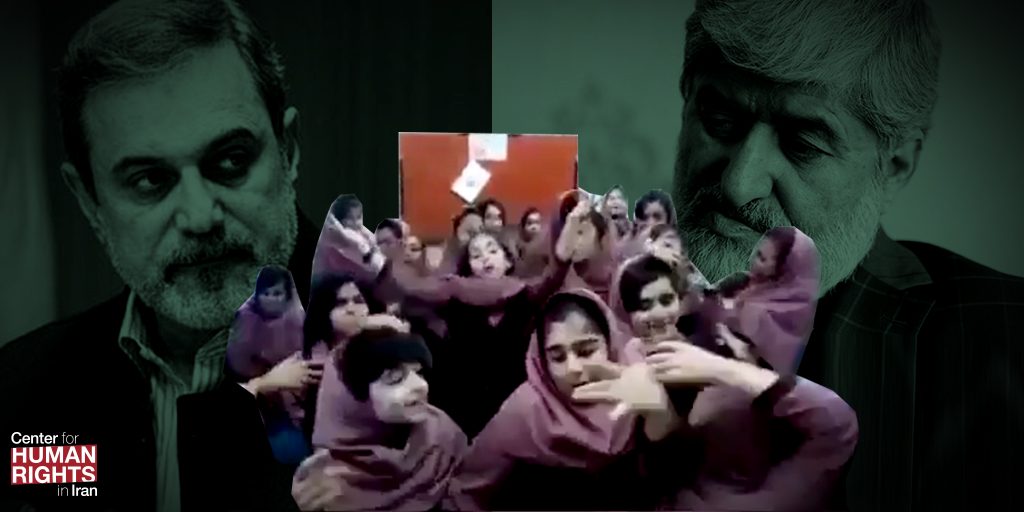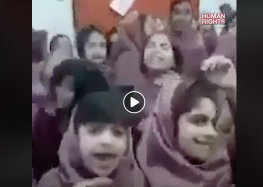Iran’s Minister of Education Sees “Plot” Behind Videos of Dancing Schoolchildren

Iran’s minister of education has called on the police to trace the “source” of what he described as “disturbing videos” of schoolchildren cheerfully dancing to a pop song by US-based Iranian singer Sasy Mankan.
The videos are part of an online “dance challenge” that features children in different schools around the country grooving to Mankan’s newly released “Gentlemen” song.
The ministry was encouraged to take action by conservative officials including a member of Parliament who demanded officials at the schools where the dancing took place be fired, and a member of the Assembly of Experts who urged the courts and Parliament to take action to prevent more videos.
The authorities are currently pursuing several students and some teachers seen dancing in the videos but it’s not clear what they will be charged with.
“The enemy is trying different ways to create anxiety among the people including by spreading these disturbing videos we have been seeing in cyberspace,” said Education Minister Mohammad Bathaei on May 7, 2019.
“I’m certain there’s some kind of political plot behind the publication of these devious clips in schools,” he added.
Bathaei added that a team of three “experts” had been appointed to find the source of the clips.
Dancing is not illegal according to Iran’s Islamic Penal Code but a person could be prosecuted for any form of dancing if the authorities deem it as “indecent” or “immoral.”
Conservative clerics and officials particularly issue condemnations and demand prosecution when women and girls are seen dancing in public.
After young girls danced on a stage in March 2018 during a Women’s Day event in Tehran, the country’s ultra-conservative prosecutor general demanded that the organizers of the event be punished.
State authorities forced teenager Maedeh Hojabri to issue an apology on state-funded TV after “confessing” to dancing in homemade videos that she later posted on her personal Instagram page.
Four young people in Tehran were handed suspended flogging and prison sentences in September 2014 for dancing in a viral video featuring Pharrell Williams’ “Happy” song.
Since Iran’s 1979 Islamic Revolution, the right to choose what to eat, what to wear, and what to enjoy have been among the most basic human rights that have been restricted by the authorities.
Several state-funded media outlets in Iran published news reports and commentaries about the recent dance videos with condemnations by officials.
Some analysts speculated that the videos are a result of UNESCO’s 2030 Agenda for Sustainable Development, non-binding guidelines that Supreme Leader Ali Khamenei forbade from being implemented in Iran in 2017.
Conservatives See “Infiltration” Plot Behind Dance Videos
Many Iranians condemned the education minister’s response to the videos, but he shot back by arguing that they’re part of a plot to undermine the Islamic Republic. “Deception or infiltration?!” he tweeted.
Abbas Ka’bi, a member of the Assembly of Experts, said the videos were part of a “pre-designed plan to weaken the morale of the Iranian people.”
On May 6, he told the Revolutionary Guards-affiliated Fars News Agency that music videos such as Sasy Mankan’s “are part of the enemy’s cultural war” against Iran that requires action by the authorities, including “prosecuting school officials and any other authority who failed in their duties.”
First Deputy Parliament Speaker Ali Motahari also called for the removal of the school’s headmasters during a speech in an open session of Parliament.
On May 8, 51 university-based units of the volunteer Basij paramilitary force sent an open letter to the education minister expressing outrage over the videos.
“What has befallen our country that inspired some students to launch a dance challenge with an indecent, meaningless song filled with ominous ideas of underground DJs?” said the statement.
But some commentators pushed back. On May 8, writer Soudabeh Sadri asked why the authorities are focused on policing happiness when Iran is facing much bigger problems.
“‘Gentleman’ is not just a song. It’s a siren heralding the defeat of those in charge of Iran’s cultural and artistic affairs in the past few decades,” she wrote in an op-ed published by the reformist Asr Iran newspaper.
“In these depressing times when we are constantly hearing about increases in the prices of goods, is it really a priority to prevent students from having fun?” she added. “Can’t they be merry just for a few minutes be it with a song by an Iranian singer in Los Angeles?”
The California-based Sasy Mankan, whose real name is Sasan Heydari, has maintained a strong following in Iran since the late 2000s.
In 2009, when he was still living in Iran and active in the underground music scene, he backed reformist presidential candidate Mehdi Karroubi, who has been under extrajudicial house arrest since February 2011.
Several Iranian users took to Twitter to condemn the authorities’ response to the dancing videos.
“The day when our religious people show as much anger toward corruption and theft of public funds as they do toward dancing and merriment by a few students in school is the day there will be hope that the country could get back on its feet,” tweeted journalist Seraj Mirdamadi.
Iranian user Peyman Moghaddam pointed to the “insanity” of pursuing the source of the Sasy Mankan dancing challenge.
“This is exactly the tragedy we’ve been experiencing in Iran these past 40 years,” he tweeted. “They want to mobilize the whole country to find out which school started the Sasy Mankan singing challenge! But at the same time, they blame others for swelling inflation, corruption, lawlessness and incompetence. May God cure your insanity, although it’s doubtful.”

